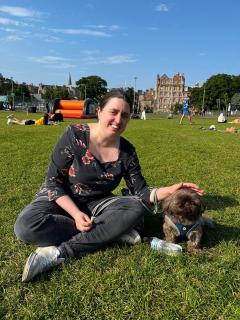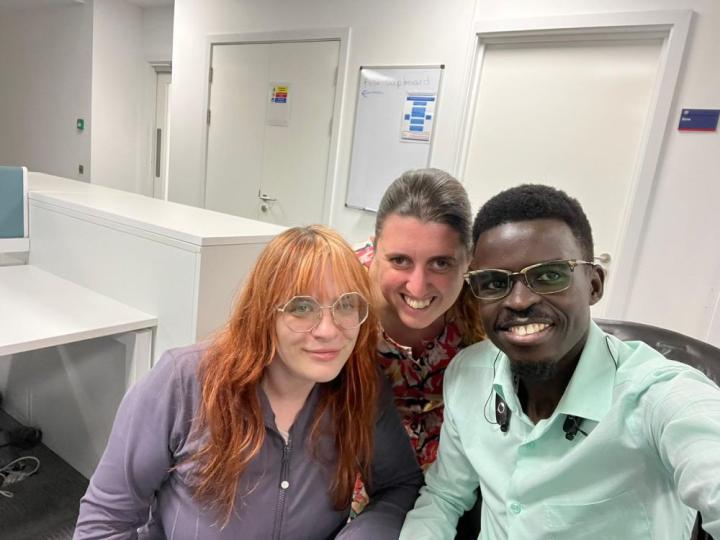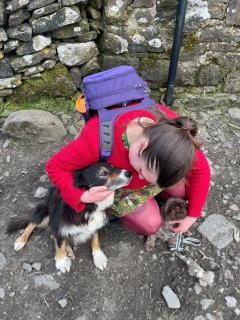Student Spotlight - Emilie McSwiggan
Meet Emilie, a former politician whose passion for public health has led her back to academia.
1. Name
Emilie McSwiggan

2. What's your project, who are your supervisors, and what's your year of study?
My PhD is 'Evaluation of social prescribing for people in later life', and my supervisors are Prof Stewart Mercer, Dr Jackie Gulland, Dr Eddie Donaghy and Dr Amy O'Donnell.
I’m working on my summer project, so will be finishing the taught (first) year soon. I needed to ask for an extension due to some difficult personal circumstances, and I’ve received so much support and kindness from the team. I always talk about this kind of thing because it’s important to know that we all face challenges in our studies, and that there’s no shame or stigma in asking for the help you need.
3. What is your background?
A patchwork! My first degree was in French and Russian. I then went back to my home island of Guernsey, first to work in the civil service and then as an elected politician. My portfolio included health, social care, social welfare and international development. I did the MPH online at Edinburgh, and during the pandemic I was involved with setting up a group here called UNCOVER, which does public health evidence reviews for decision-makers. My wife and I moved to Glasgow in 2020, and I commute to Edinburgh for classes. I still work part-time as UNCOVER’s project manager alongside my studies, and spend most of my time outside work as Butler-in-Chief to a tiny, affectionate and utterly spoiled shih tzu called Mishka.
4. What drew you to the Academy?
Maybe you have this mental image of a PhD student as a lonely researcher in an ivory tower – I know I did, and it put me off further study for a long time. So what I like about the Academy is how completely it turns that image on its head. We’re not alone – we’re part of a cohort and a wider academic community. Our work is team work, and we have so much to learn from each other. And we’re not in an ivory tower – the whole ACRC ethos is about doing things that are going to have a positive impact, to improve people’s real-life experience of ageing and care. That motivates me more than anything; I want to do work that matters to people.

5. How are you finding your taught year?
It’s a luxury. A privilege. You have this whole year to read, explore, think – and make connections with the people who are going to be alongside you for the rest of your PhD, and who are going to be your future colleagues, friends, and sources of collaboration and inspiration. I also found the routine of attending classes and preparing assignments helpful for easing me back into academic life, and for thinking about how I want to organise my time during the research phase. If you have the opportunity to take part in a PhD programme with a taught year, the time and space it gives you to get to grips with your future research is just immensely valuable, and I can’t recommend it highly enough.
6. What is your PhD about and why does it matter to you?
I’m going to be evaluating how well social prescribing works for older adults. So what’s social prescribing? Well, if you visit your GP with a complex set of physical or mental health challenges, that are muddled in with the social and financial circumstances of your life – as so many of our health issues are – you might find that she responds by referring you on to a Link Worker in the same medical practice. You’ll sit down with the Link Worker and talk about all this. She might see that you’re lonely, and recommend social connection – perhaps by joining a local community group. Or she might see that you’re struggling to adapt to a change in your health circumstances – say, if you’re gradually losing your vision – and put you in touch with a group of people with the same experience. Or perhaps an outdoor exercise programme, or an arts group. The point of social prescribing is that it’s personal to you, and it doesn’t look at your health problems in isolation, but in the context of your real life. My research project is still shaping up, but at the moment I’m particularly interested in understanding what kind of community infrastructure we need – what kind of social groups, clubs or programmes, and how we access them – in order for social prescribing to work as well as it possibly can for older adults.

7. What’s something that has surprised you about your experience so far?
I have really enjoyed the working relationships with my supervisory team so far. Coming back to academia after a bit of a career, I wasn’t sure I could readjust to the kind of student-teacher relationships you have as an undergraduate – but it’s not like that at all. It’s much more of a partnership, and it’s one I’ve found very enriching, supportive and inspiring. If you are applying for a PhD, do try and connect with your potential supervisor(s) beforehand – these working relationships make such a difference to your experience, and it’s so important they work well for you.
8. Any tips for those interested in a PhD?
I’m starting my PhD in my mid-thirties – and if you had told me that at 18, I would have thought I’d failed somewhere along the line. But instead I can see how everything I’ve learned in the last ten or fifteen years can find its place in helping to shape my PhD and the way I approach it. So I guess my tip is, there’s no wrong time to start a PhD – I’ve loved being part of a cohort with diverse backgrounds and experiences, and I think it can be a really valuable and enriching experience, whatever stage you’re at in your life and your work.
9. Any professional platforms you would like to share?
My University profile is here: https://www.ed.ac.uk/profile/emilie-mcswiggan.

